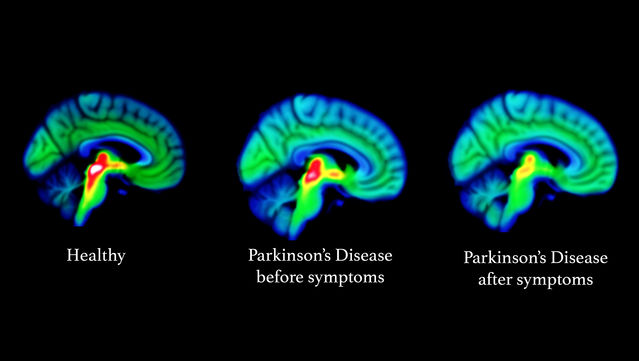Dopamine
Serotonin Malfunctions May Be a Harbinger of Parkinson's
Loss in serotonin function may be an early warning sign of Parkinson’s disease.
Posted June 19, 2019 Reviewed by Gary Drevitch
Years before someone with Parkinson's disease has any movement-related symptoms, slight malfunctions of the brain's serotonin system could be an early warning sign that the roots of PD are taking hold in the brain, according to a new study (Wilson et al., 2019) by researchers at King's College London. These findings were published today in The Lancet Neurology journal.

According to a news release from KCL, this study "provides the first evidence of a central role for the brain chemical serotonin in the very earliest stages of Parkinson's."
Early markers of Parkinson's disease take root in the brain long before a patient displays any motor or cognitive deficits. Over time, patients with Parkinson's disease experience a build-up of α-synuclein, which is a presynaptic neuronal protein that is genetically and neuropathologically associated with PD. As mentioned, until now, it was impossible for neurologists to pick up any early clues that Parkinson's disease was beginning to take hold inside the brain, which makes the new discovery from KCL potentially groundbreaking.
"We found that serotonin function was an excellent marker for how advanced Parkinson's disease has become," first author Heather Wilson, from KCL's Institute of Psychiatry, Psychology and Neuroscience (IoPPN), said in a statement. "Crucially, we found detectable changes to the serotonin system among patients who were not yet diagnosed. Therefore, brain imaging of the serotonin system could become a valuable tool to detect individuals at risk for Parkinson's disease, monitor their progression, and help with the development of new treatments."
"Parkinson's disease has traditionally been thought of as occurring due to damage in the dopamine system, but we show that changes to the serotonin system come first, occurring many years before patients begin to show symptoms," senior author Marios Politis of KCL and the Michael J. Fox Foundation for Parkinson's Research said. "Our results suggest that early detection of changes in the serotonin system could open doors to the development of new therapies to slow, and ultimately prevent, the progression of Parkinson's disease."
Hopefully, someday soon, brain scans that illuminate serotonergic pathology in the brain might be widely used as an early screening tool for identifying those who are at the highest risk of developing Parkinson's disease. Unfortunately, from a pragmatic vantage point, skyrocketing healthcare costs might make the use of current PET scans used to screen for Parkinson's disease cost prohibitive. Also, this PET scanning technique is relatively complex. That said, the researchers are looking for ways to make the brain scanning options for detecting changes in serotonin function as part of screening for Parkinson's more straightforward and affordable.
LinkedIn Image Credit: Photographee.eu/Shutterstock
References
Heather Wilson et al. "Serotonergic Pathology Linked with the Premotor Phase of A53T α-Synuclein Parkinsonism and with Disease Burden: Cross-Sectional Studies” The Lancet Neurology (First published: June 19, 2019) DOI: 10.1016/S1474-4422(19)30140-1


